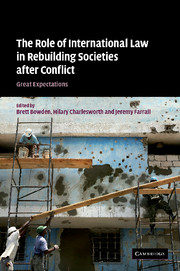Book contents
- Frontmatter
- Contents
- Contributors
- Preface
- Abbreviations
- Introduction
- 1 The ‘state-building enterprise’: Legal doctrine, progress narratives and managerial governance
- 2 Democratisation, state-building and politics as technology
- 3 International law, human rights and the transformative occupation of Iraq
- 4 Defining democracy in international institutions
- 5 Democracy and legitimation: Challenges in the reconstitution of political processes in Afghanistan
- 6 Impossible expectations? The UN Security Council's promotion of the rule of law after conflict
- 7 Legal pluralism and the challenge of building the rule of law in post-conflict states: A case study of Timor-Leste
- 8 From paper to practice: The role of treaty ratification post-conflict
- 9 Selective universality? Human-rights accountability of the UN in post-conflict operations
- 10 ‘Security starts with the law’: The role of international law in the protection of women's security post-conflict
- 11 Grappling in the Great Lakes: The challenges of international justice in Rwanda, the Democratic Republic of Congo and Uganda
- Conclusion: Hope and humility for weavers with international law
- Select Bibliography
- Index
Conclusion: Hope and humility for weavers with international law
Published online by Cambridge University Press: 31 August 2009
- Frontmatter
- Contents
- Contributors
- Preface
- Abbreviations
- Introduction
- 1 The ‘state-building enterprise’: Legal doctrine, progress narratives and managerial governance
- 2 Democratisation, state-building and politics as technology
- 3 International law, human rights and the transformative occupation of Iraq
- 4 Defining democracy in international institutions
- 5 Democracy and legitimation: Challenges in the reconstitution of political processes in Afghanistan
- 6 Impossible expectations? The UN Security Council's promotion of the rule of law after conflict
- 7 Legal pluralism and the challenge of building the rule of law in post-conflict states: A case study of Timor-Leste
- 8 From paper to practice: The role of treaty ratification post-conflict
- 9 Selective universality? Human-rights accountability of the UN in post-conflict operations
- 10 ‘Security starts with the law’: The role of international law in the protection of women's security post-conflict
- 11 Grappling in the Great Lakes: The challenges of international justice in Rwanda, the Democratic Republic of Congo and Uganda
- Conclusion: Hope and humility for weavers with international law
- Select Bibliography
- Index
Summary
Imperial international law
Much of the scholarship in this book implies that international law can be read as an imperialist institution with a history of dutiful service to the most powerful invading militaries. Note, however, that this charge is more about acquiescing in domination than in doing it. International law takes the form of Western law because almost all state law does. Only a tiny fraction of the world's Muslims are governed by Sharia law. Transplanted European legal systems govern in all of the largest Muslim societies. There is no society in the Americas ruled by the legal systems of the pre-European nations of those societies. Nor is there in Africa or Asia or even more traditional societies in Oceania a nation that has not modelled most of its laws and the structure of its laws (the idea of having criminal law as distinct from other wrongs, for example) on those of one of the colonial powers, even if it did not experience direct colonial occupation – no Hindu-law state, nor Buddhist, nor Confucian, nor animist. All these regulatory traditions persist in sub-national normative orders. Wood was able to map 99 per cent of the world's population as governed by one or another Western European legal tradition in respect of its financial laws (broadly conceived), the largest being 33 per cent of the world governed by the common law. Only seven Middle-Eastern Islamic law states accounted for the exceptions.
- Type
- Chapter
- Information
- The Role of International Law in Rebuilding Societies after ConflictGreat Expectations, pp. 270 - 288Publisher: Cambridge University PressPrint publication year: 2009
- 2
- Cited by

